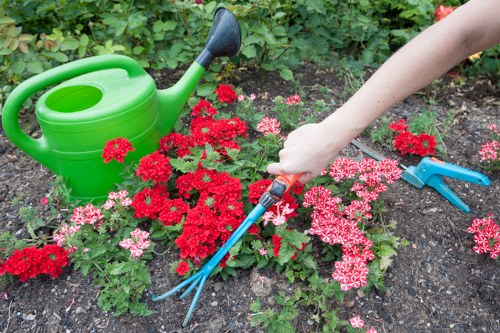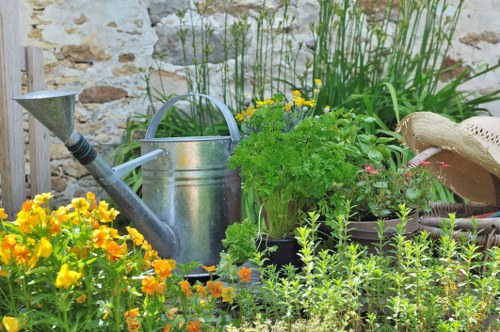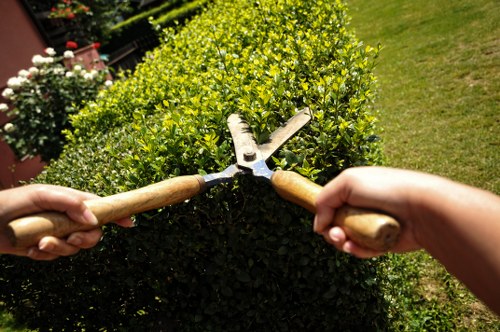Lawn Mowing in Gardening Gardeners

The Importance of Lawn Mowing in Garden Care
Lawn mowing is a fundamental aspect of garden maintenance. Regular mowing not only keeps your garden looking neat and tidy, but it also plays a crucial role in the overall health of your grass and plants. Proper mowing techniques can enhance curb appeal and ensure a vibrant, lush lawn.
Maintaining the right height and frequency of mowing can prevent common issues such as weeds and pests. By keeping your grass at an optimal length, you make it harder for invasive weeds to take hold, reducing the need for chemical interventions. Additionally, a well-mowed lawn can help in preventing diseases that thrive in overgrown grass.
Furthermore, regular mowing improves the accessibility and safety of your garden. Shorter grass reduces the hiding spots for pests and makes it easier to spot any potential hazards. It also promotes better air circulation, which is essential for the health of both the grass and surrounding plants.

Best Practices for Effective Lawn Mowing
Choosing the Right Mower
Selecting the appropriate mower is essential for achieving the desired results in lawn care. There are various types of mowers available, each suited to different garden sizes and grass types.
Types of Mowers
- Push Mowers: Ideal for small to medium-sized lawns, push mowers are eco-friendly and require manual effort.
- Self-Propelled Mowers: These mowers make the task easier by assisting with the movement, suitable for larger gardens.
- Electric Mowers: Quiet and low-maintenance, electric mowers are a great option for environmentally conscious gardeners.
- Gas-Powered Mowers: Best for extensive lawns, gas-powered mowers offer power and efficiency for larger areas.
Mowing Techniques
Effective mowing techniques are just as important as the equipment you use. Adopting the right approach can significantly impact the health and appearance of your lawn.
Optimal Mowing Height
Maintaining the correct mowing height is crucial. Generally, it’s recommended to mow your lawn to a height of 2.5 to 3 inches. This allows the grass to develop deep roots, making it more resilient to drought and heat.
Mowing Frequency
The frequency of mowing depends on the growth rate of your grass, which is influenced by the season and weather conditions. During the peak growing season, mowing once a week is typically sufficient.

Seasonal Lawn Mowing Tips
Spring Mowing
Spring is a critical time for lawn care. As the weather warms, your grass begins to grow rapidly. Mowing in spring helps to stimulate growth and prepare your lawn for the upcoming seasons.
First Cuts
For the first mow of the season, raise the mower blades slightly to encourage the grass to grow upwards, promoting density and health.
Summer Mowing
During the summer months, it’s important to mow frequently to keep up with the rapid growth. However, avoid cutting more than one-third of the grass height at a time to prevent stress.
Watering and Mowing
Ensure your lawn is adequately watered before mowing, especially during dry spells. Mowing dry grass can reduce the risk of spreading diseases.

Maintaining Your Mower
Regular maintenance of your lawn mower is essential to ensure it operates efficiently and prolong its lifespan. Proper care can prevent common issues and keep your mowing tasks smooth.
Sharpening Blades
Dull blades can damage your grass, leading to ragged edges and increased susceptibility to diseases. Sharpen your mower blades at least once a season or more frequently if used heavily.
Cleaning and Storage
After each mowing session, clean off any grass clippings and debris from the mower. Store your mower in a dry, sheltered area to protect it from the elements and prevent rusting.

Eco-Friendly Lawn Mowing Practices
Adopting eco-friendly mowing practices can benefit both your garden and the environment. By being mindful of your mowing methods, you can reduce your carbon footprint and promote sustainability.
Mulching Mowers
Using a mulching mower can help recycle grass clippings back into the lawn, providing essential nutrients and reducing the need for chemical fertilizers.
Electric vs. Gas Mowers
Electric mowers produce fewer emissions compared to gas-powered ones, making them a greener choice for environmentally conscious gardeners. Additionally, they are typically quieter and require less maintenance.
Reducing Mowing Frequency
Allowing your grass to grow slightly longer can help improve its resilience and reduce the frequency of mowing required. This approach also supports biodiversity by providing habitat for beneficial insects.
Final Thoughts
Effective lawn mowing is a blend of proper technique, the right equipment, and regular maintenance. By following these best practices, gardeners can achieve a beautiful, healthy lawn that enhances the overall appeal of their garden.
Ready to transform your lawn? Contact us today to schedule your professional lawn mowing service and enjoy a pristine garden all year round!



